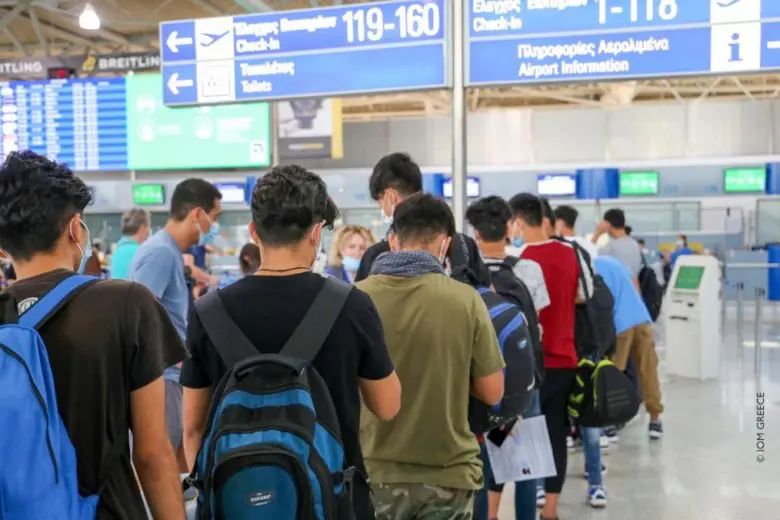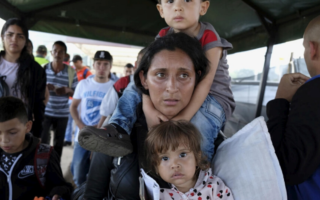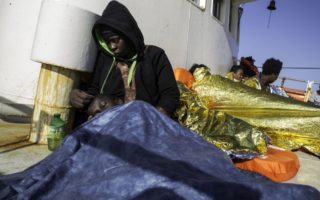
A group of unaccompanied children prepare to check in for their flight from Athens to Lisbon on 7 July, under an EU relocation scheme. © IOM/Christine Nikolaidou
On the eve of the launch of the presentation of the European Commission’s new Pact on Migration and Asylum, UNHCR, the UN Refugee Agency, and IOM, the International Organization for Migration, are appealing to the European Union (EU) to ensure a truly joint and principled approach that addresses all aspects of migration and asylum governance. The two UN bodies are hopeful that the Pact will provide a fresh start to move from an ad hoc crisis-driven approach to asylum and migration in Europe to a common one that is more comprehensive, well-managed and predictable, both within and beyond the EU. With relatively few new arrivals of refugees and migrants to Europe, now is the time for common action.Recent events across the Mediterranean, including delays in disembarking migrants and refugees rescued at sea, increasing reports of push-backs and the devastating fires at the Moria Registration and Identification Centre (RIC) on the Greek island of Lesvos, have further highlighted the urgent need to reform the EU’s management of migration and asylum. COVID-19 has also heavily affected relevant policies and practices, and its detrimental socio-economic impact has not spared anyone. Refugees, migrants and large refugee hosting countries around the world, have been particularly affected.
The current approach in the EU is unworkable, untenable and often carries devastating human consequences. With the lack of EU-wide agreement on disembarkation exacerbating human suffering, the organizations have been jointly calling for a common EU action to take responsibility for search and rescue, and for disembarking people rescued at sea. IOM and UNHCR strongly agree with European Commission President Ursula von der Leyen that saving lives at sea is not optional; a welcome assertion made in her State of the Union address. The organizations also extend concern for those along all migration routes who find themselves endangered, including on land. Saving lives must be the priority and should not be impeded or criminalized.
UNHCR and IOM have also called for more predictable arrangements on relocation within the EU, and actively supported recent relocations from the Greek islands, working with the Greek Government, the European Commission, EASO and UNICEF, the UN Children’s Fund. The relocation of vulnerable people, including children, especially at a time of heightened hardship, has proven to be a workable example of responsibility sharing.
“The Pact presents the opportunity for Europe to show that it can uphold the fundamental right to asylum, while cooperating on pragmatic policies to identify those in need of international protection and share responsibility for them,” said Filippo Grandi, the UN High Commissioner for Refugees. “We will welcome genuine efforts to ensure a fast, fair and effective protection regime in Europe, and pledge our full support and expertise to the European Commission and Member States in making it a reality.”
Most migration to Europe is managed through safe and legal channels, and the COVID-19 crisis has highlighted the value of migrant and refugee workers in the EU and elsewhere. Their contributions and potential should be maximized. Well-managed human mobility will not only be instrumental in recovering from the pandemic, however. It should also be mainstreamed and inform longer-term policy and responses, including to climate change, as well as support flexible and dynamic labour markets.
“People on the move can be part of the solution. We are looking forward to the new Pact as an opportunity for Europe to reimagine the governance of migration and human mobility as safe, orderly, inclusive and human rights centred.” said Antonio Vitorino, IOM Director General. “A balanced, principled and comprehensive approach recognizes that migration is a human reality to be managed towards mutually beneficial ends. It will also be important for the EU to ensure that longer-term policy is coherent in its internal and external aspects, is rooted in genuine partnerships, and aligned with existing international frameworks and agreements,” he added.
Progress on fighting smuggling and enhancing humanitarian border management can be achieved with equal attention and resources devoted to strengthening and broadening legal migration and safe pathways, genuine partnerships, integration and building prosperous, healthy, cohesive communities. It can also reduce the demand that feeds the business of criminal smuggling groups. Investing in regular migration channels and enhanced mobility will also be essential to sustainable development and growth in the EU and elsewhere.
Dignified returns, for those who wish to return to their countries of origin or who are found not to be in need of international or other forms of protection, are equally crucial to a well-managed, comprehensive system. Voluntary returns should be prioritized and include provisions for sustainable reintegration. Some migrants, including victims of trafficking, sexual abuse and unaccompanied children, who are found not in need of asylum may have a legitimate need for other forms of assistance and protection.
The EU’s commitment to predictable global solidarity and responsibility sharing in partnership with large refugee-hosting countries outside the EU is also welcomed. This commitment has to be translated into action with additional, predictable and flexible financial assistance and political support to hosting states, including to strengthen their asylum systems. This will ensure migrants and refugees have adequate access to services, such as health, education and work, so they can live their lives in dignity. More strategic support to countries hosting the largest numbers of refugees or transit countries would also diminish the appeal of being smuggled.
With a viable future and greater commitment from EU countries to resettlement, complementary pathways and family reunification, coupled with the conditions to ensure direct access to territory and asylum in the EU for those who need it, fewer people might resort to dangerous journeys and states will be better able to manage arrivals.
The European Commission, the executive arm of the EU, will present its Pact for Migration and Asylum, tomorrow, Wednesday 23 September, to EU Member States. The EU has the opportunity to ensure a united and human rights-centred Europe, where migrants and refugees can contribute their skills and resources—a Europe that leaves no one behind. UNHCR and IOM stand ready to support the EU and its Member States in line with their respective mandates and expertise.
For further information, please see:
- UNHCR’s Recommendations for the European Commission’s Proposed Pact on Migration and Asylum
- IOM Views on the Roadmap for the EU’s New Pact on Migration and Asylum
Or please contact:
IOM
- In Brussels, Ryan Schroeder: rschroeder@iom.int , + 32 492 25 02 34
- In Geneva, Paul Dillon: pdillon@iom.int, +41 79 636 9874
UNHCR
- In Brussels, Maeve Patterson: patterso@unhcr.org , +32 470 99 54 35
- In Geneva, Shabia Mantoo: mantoo@unhcr.org, +41 79 337 7650
Originally published by UNHCR on 22 September 2020.





